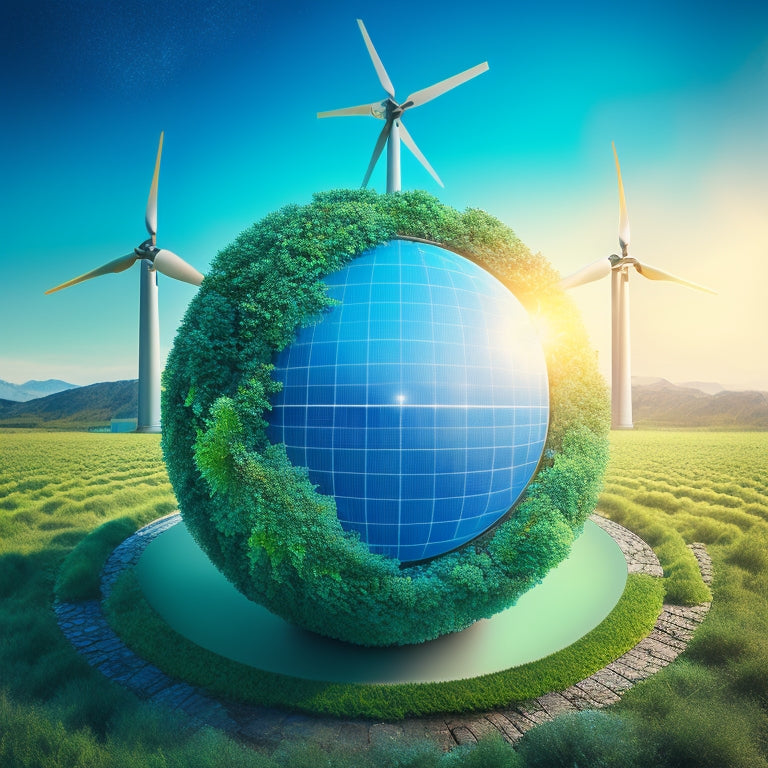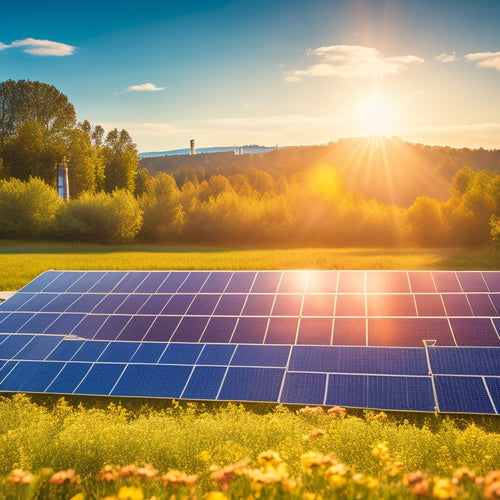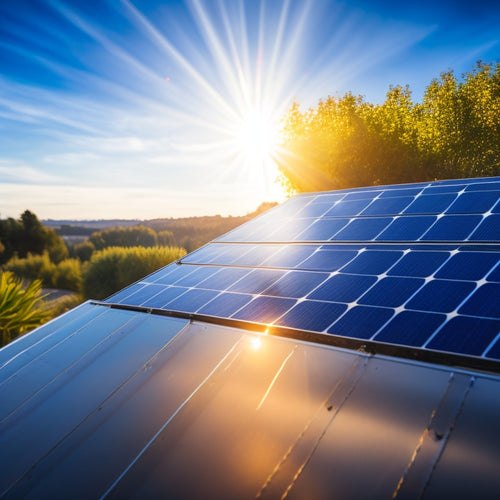
Maximizing Energy Independence With 3 Key Strategies
Share
To maximize energy independence, you'll want to implement three key strategies. First, incorporate solar energy into your plan, reducing your reliance on traditional sources and enjoying lower energy costs. Next, utilize smart energy storage solutions to store excess energy and stabilize your supply. Finally, optimize your off-grid efficiency by selecting the right components, managing energy usage patterns, and orienting solar panels for maximum harvesting. By combining these strategies, you'll be well on your way to achieving true energy independence - and a deeper exploration into each component will reveal even more benefits.
Key Takeaways
• Invest in solar energy to reduce reliance on traditional energy sources and promote sustainability.
• Implement smart energy storage solutions to store excess energy and provide reliable backup power.
• Optimize off-grid systems by selecting and sizing components to match specific energy needs and usage patterns.
• Ensure efficient energy harvesting by orienting and tilting solar panels for maximum energy output.
• Use load management and optimization algorithms to ensure energy supply meets demand and minimize waste.
Unlocking Power With Solar Energy
Additionally, when contemplating ways to maximize energy independence, harnessing the power of solar energy becomes an increasingly attractive option, especially considering the rapid decline in solar panel costs and advancements in technology.
By integrating solar panels into your renewable infrastructure, you can greatly reduce your reliance on traditional energy sources. With the cost of solar panels dropping by over 70% in the last decade, it's now more crucial than ever to harness the power of the sun.
When designing your solar panel system, it's vital to take into account factors such as panel efficiency, system size, and installation orientation. A well-designed system can provide a substantial portion of your energy needs, reducing your carbon footprint and energy bills.
Additionally, solar panels require minimal maintenance and can last up to 30 years or more, making them a reliable choice for energy generation. By investing in solar energy, you'll not only reduce your energy costs but also contribute to a cleaner, more sustainable future.
Smart Energy Storage Solutions
You can optimize your energy independence by integrating smart energy storage solutions, which enable you to store excess energy generated by your solar panel system for later use, reducing reliance on the grid and minimizing energy waste.
By incorporating advanced battery technologies, you can stabilize your energy supply and guarantee a reliable backup power source. This not only enhances grid resilience but also allows you to optimize your energy usage patterns.
Smart energy storage solutions also enable real-time monitoring and optimization of your energy storage systems, ensuring maximum efficiency and prolonged battery life.
Through advanced battery optimization algorithms, you can maximize your energy storage capacity, reducing the likelihood of energy waste and making sure that you're getting the most out of your solar panel system.
Optimizing Off-Grid Efficiency
Optimize your off-grid energy system's efficiency by strategically selecting and sizing components to match your specific energy needs, ensuring that your system operates within a stable and reliable capacity. This involves careful planning and consideration of your energy usage patterns, as well as the capabilities of your renewable energy sources.
Load management is essential in off-grid systems, as it guarantees that your energy supply meets your demand. Effective load management enables you to prioritize essential loads during periods of low energy availability, ensuring that critical systems remain operational.
To achieve peak efficiency, consider the following key factors:
| Component | Optimization Strategy |
|---|---|
| Solar Panels | Orient and tilt panels for maximum energy harvesting |
| Energy Storage | Size batteries to meet peak demand and provide backup power |
| Inverters | Select inverters with high efficiency ratings and grid resilience |
| Charge Controllers | Optimize charging algorithms for maximum energy yield |
| Load Management | Implement smart load management systems for efficient energy distribution |
Frequently Asked Questions
How Much Maintenance Is Required for Off-Grid Energy Systems?
You'll need to monitor your off-grid energy system regularly to minimize system downtime, ensuring battery life cycles last up to 15 years, depending on usage and maintenance, which includes monthly checks and annual deep-discharge tests.
Can I Still Use My Existing Electrical Appliances Off-Grid?
You're wondering if your beloved appliances will still work off-grid? Fortunately, most energy-efficient appliances are compatible, but it's important to check their power ratings and adjust your energy usage to guarantee seamless integration with your off-grid system.
What Happens to My Energy Independence During a Grid Outage?
During a grid outage, you'll maintain energy independence with backup planning, ensuring power resilience through stored energy and backup generators, allowing you to keep critical appliances running and minimizing disruptions to your daily life.
Are There Any Government Incentives for Off-Grid Energy Systems?
You can benefit from government incentives for off-grid energy systems, including tax credits for renewable energy installations and grants for rural or underserved communities, which can greatly reduce your upfront costs.
Can I Add Off-Grid Capabilities to My Existing Home?
You can retrofit your existing home with off-grid capabilities by starting with an energy audit to identify areas of improvement, then exploring retrofitting options like solar panels, battery storage, and energy-efficient upgrades.
Related Posts
-

Solar Phone Chargers for Camping Essentials
Solar phone chargers are must-haves for your camping essentials, allowing you to stay connected while enjoying nature...
-

Advantages of Solar Generating Systems Over Traditional Energy
Solar generating systems provide several key advantages over traditional energy sources. You'll experience lower long...
-

How Efficient Are Thin Film Solar Cells
Thin film solar cells provide an innovative approach to energy generation, boasting efficiency rates generally betwee...


